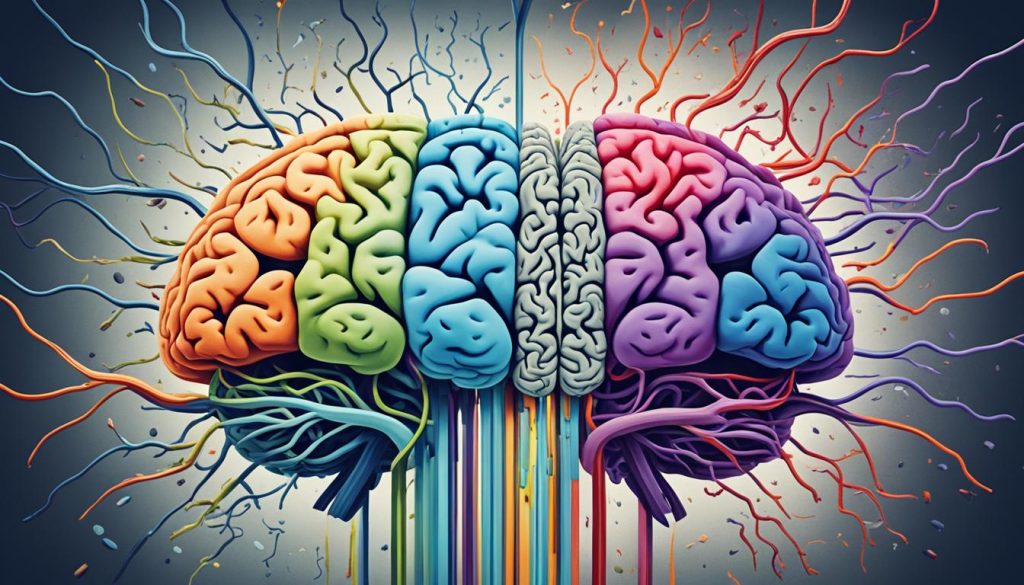Have you ever thought about how stress really impacts your health? Is stress just a small worry or something more serious? We’re going to look closer at what stress does to our bodies.
Stress can be a big deal for our well-being, affecting both the body and the mind. It leads to high blood pressure and even heart issues. Anxiety and depression can also pop up, showing how stress isn’t just a small issue.
Key Takeaways:
- Stress affects the body both physically and mentally, leading to various health issues.
- Common symptoms of stress include headaches, muscle tension, fatigue, stomach upset, and sleep problems.
- Chronic stress can increase the risk of developing mental health disorders like anxiety and depression.
- Prolonged stress can contribute to the development of chronic diseases such as heart disease and diabetes.
- Stress can impact brain function, memory, and concentration, and increase the risk of cognitive disorders.
Physical Effects of Stress
Stress can reveal itself strongly in our bodies. Our body reacts in different ways when we’re stressed (body responses to stress). This can lead to physical and physiological effects that affect our health. It’s important to understand these effects to notice when we’re stressed and find ways to handle it well.
When you’re stressed, you might notice things like muscle tightness, headaches, (stress signs in the body), and chest pain. These symptoms can add to your stress. Stress might also cause tiredness and trouble sleeping. It makes it hard to keep up your energy or get a good night’s rest. Stress can make your muscles hurt a lot, making it difficult to feel comfortable.
Stress doesn’t only affect how your muscles and bones feel. It can also make your immune system weaker (physiological effects of stress). Without a strong immune system, you may get sick more often. This could mean catching colds or the flu frequently, which won’t help you feel better.
The stress you feel can also mess with your stomach. You might get an upset stomach, feel nauseous, or even get severe stomach problems (physical effects of stress). How your brain and gut work together is crucial here. Stress hormones can mess with your gut, which might cause you to have tummy troubles or trouble getting key nutrients.
To manage stress well, it’s important to know how it shows up in your body. Try to do things like exercise often, practice relaxation, and lead a healthy life. These steps can reduce how much stress affects your body and help you feel better. Taking actions to relax and boost your immune system can lead to a happier, healthier life (body responses to stress, stress signs in the body).
| Physical Effects of Stress: |
|---|
| Muscle tension |
| Headaches |
| Chest pain |
| Fatigue |
| Stomach upset |
| Sleep problems |
| Weakened immune system |
| Increased vulnerability to illnesses |
| Digestive issues |
Mental Health Impact of Stress
Stress affects more than the body. Mental health takes a big hit too. It’s vital to notice and deal with these issues. Chronic stress can really mess with your mind, leading to various symptoms. It also bumps up the chance of having mental health problems.
Anxiety is a major symptom of stress. It brings ongoing feelings of worry, restlessness, and unease. Not being able to get things done because you can’t focus is another sign. Overwhelm, sadness, or even depression are also common with stress.
Stress can make you irritable too. This means you might be on edge all the time. These mental symptoms severely impact life quality. They mess with how you work, relate to others, and find joy in life.
To tackle the mental impacts of stress, start with your physical health. Regular exercise or yoga can make a big difference. They release chemicals that boost your mood and calm anxiety. It’s also important to take care of your mind. Deep breathing, meditation, and other self-care activities can lower stress levels.
Positively Coping with Stress
It’s key to pick up healthy ways to deal with stress. Here are some tips:
- Engage in regular physical activity
- Practice relaxation techniques like deep breathing and meditation
- Maintain a healthy and balanced diet
- Get enough sleep and practice good sleep hygiene
- Build and maintain a strong support network of family and friends
By using these methods, you can reduce stress’ mental toll and improve your well-being.
| Physical Symptoms of Stress | Mental Health Impact |
|---|---|
| Headaches | Anxiety |
| Muscle tension | Restlessness |
| Chest pain | Lack of motivation or focus |
| Fatigue | Feeling overwhelmed |
| Stomach upset | Sadness or depression |
| Sleep problems | Irritability |
Stress and Chronic Diseases
Prolonged stress greatly affects our health. It can even cause chronic diseases or make them worse. Stress harms our bodies in many ways. This leads to health issues and a higher chance of getting sick due to stress.
Stress can cause problems like heart disease and obesity. It can also raise your blood pressure. This makes your heart work harder over time. Stressed people may eat more, gain weight, or find it hard to lose weight. This can lead to more health issues related to being overweight.
Stress doesn’t only harm your heart. It weakens the immune system too. This makes you more likely to get sick or have a hard time getting better.
| Chronic Diseases | Impact of Stress |
|---|---|
| Heart disease | Stress can make heart disease worse by upping your blood pressure and stressing your heart. |
| High blood pressure | Stress can raise your blood pressure, making you more likely to have hypertension and its complications. |
| Obesity | It can change your eating habits and make you gain weight. This raises the risk of obesity and its health problems. |
| Diabetes | It affects your blood sugar and insulin, making type 2 diabetes more likely under stress. |
| Autoimmune disorders | Stress can make autoimmune diseases worse or trigger flare-ups. |
Understanding how stress harms us is crucial. We must take steps to handle stress and get necessary help. This way, we can lower the chance of getting sick and feel better.
Effects of Stress on the Brain
Stress affects our bodies and minds. It can make us forgetful and have trouble concentrating. Significant stress hinders our ability to think and keep memories.
Stress plays a role in cognitive issues like Alzheimer’s. It can change the brain’s structure and function. These changes harm mental health and cognition.
The brain’s reaction to stress varies. Some people are more resilient than others. Brain health benefits from regular exercise, balanced meals, and proper sleep.
Mindfulness and deep breathing can lower stress. These methods boost focus, memory, and learning. They keep the brain calm and sharp.
Protecting Brain Health
It’s critical to care for our brains against stress. This can mean hobbies, reading, and staying connected. Taking time off to relax also helps with brain health.
Recognizing stress’s effects leads to better mental health practices. It includes managing stress and seeking support when needed. These are keys to a healthy brain.

Stress and the Immune System
Our immune system is key to staying healthy by fighting infections and diseases. Yet, stress can hurt how well our immune system works. This is why it’s important to understand the link between stress and immunity.
Stress can lower our defenses against illnesses. It does this by releasing cortisol into our bodies. This hormone can mess up our immune response and cause more inflammation. As a result, we might get sick more often or heal slowly.
Long-term stress could also reduce the number and power of important immune cells. These cells, like T-cells and B-cells, are crucial for keeping us healthy. Plus, stress can make it harder for our immune system to fight off harmful germs.
But stress not only affects our immune system immediately. It can lead to serious health issues, like heart disease and diabetes. Autoimmune disorders are also more likely to happen when we’re stressed. All these conditions make our immune system work harder and weaken our defenses against diseases.
To combat this, it’s essential to manage stress well. Activities like regular exercise, mindfulness, and staying connected with others can help. These steps can minimize the negative impact of stress on our immunity.
Stress Management Techniques to Support the Immune System
There are several ways to handle stress and keep our immune system strong:
- Regular physical activity: Exercise can lower stress and boost immunity.
- Mindfulness practices: Things like deep breathing and yoga can help calm stress and improve immune health.
- Building a strong support network: Talking to friends and family can ease stress and protect your immune system.
- Healthy sleep habits: Getting enough rest and sticking to a sleep routine is vital for a strong immune system.
- Engaging in enjoyable activities: Doing things you love can counter stress and help your immune system stay resilient.
By managing stress effectively, we can enhance our immune system. This, in turn, lifts our health and happiness levels. Remember, if stress becomes overwhelming, professional help is always available from healthcare experts or mental health specialists.
Coping with Stress-Related Symptoms
Dealing with stress symptoms requires certain methods to help. These techniques can lower stress and improve how you feel.
Regular Physical Activity
Being active is great for your body and mind. It helps release natural mood boosters and cuts stress hormones. Endorphins are our friends for feeling good.
Choose any active hobby you love. It could be running, yoga, or just walking outside. Doing something you enjoy helps manage stress well.
Relaxation Techniques
Relaxing deep breathing and meditation can calm you. They activate your body’s chill mode. This reduces stress and worry.
Meditation focuses your mind to bring peace. Setting aside only a few minutes daily can make a big difference. It helps handle stress better.
Maintaining a Healthy Social Support Network
A strong social network is key to dealing with stress. Talk to friends, family, or support groups. It lets you share, get advice, and feel supported.
Work on current relationships and make new ones. Look for clubs or groups you share interests with. Connecting with others can lessen stress’s effects.
Practicing Good Sleep Hygiene
Getting enough sleep is vital for well-being. It can either help or hurt stress levels. So, maintaining a good sleep routine is important.
Stick to a sleep schedule and bedtime routine. Ensure your sleep area promotes rest. Also, try not to nap in the day or use electronics before sleep for better sleep quality.
Engaging in Enjoyable Activities
Take time for activities that bring you joy. It’s a great way to break from stress. Activities like hobbies, reading, music, or nature walks can relax and refresh you.
Don’t forget to care for yourself. It’s fundamental in managing stress. Schedule activities that you love regularly to maintain happiness.

These techniques can enhance your well-being. But, remember, finding your best stress management method is a personal journey. Make caring for yourself a top priority.
Stress Management Techniques
There are many ways to deal with stress. These strategies not only help you feel better but also keep you healthier. Here, we’ll explore a few of these methods.
1. Humor
They say laughter is the best medicine. It’s true! Finding the funny in life can lower stress and make you happier. So, watch a comedy or hang out with friends who always make you giggle.
2. Spending Time with Family and Friends
Being with those you care about is key for beating stress. You can play games with your family, share a meal with friends, or have heartfelt talks. These moments help you relax and feel supported.
3. Pursuing Hobbies and Passions
Doing what you love is a great way to unwind. It could be anything from painting to playing sports. Including these activities in your routine can really lift your spirits.
4. Journaling
Writing your feelings down is a special way to cope with stress. The act of journaling lets you sort through your thoughts and feelings. It might even help you find answers to your problems.
5. Maintaining a Balanced Diet
Eating right is crucial for your mind and body. Fill your plate with nutritious foods. Stay away from too much sugar and processed snacks. These can make stress worse by causing inflammation.
6. Reducing Tobacco and Alcohol Use
Smoking and drinking too much isn’t good for stress. They can make things worse. It’s best to cut down or quit to protect your wellbeing.
7. Finding Active Ways to Manage Stress
Moving your body is a powerful stress-buster. Consider trying yoga, running, swimming, or dancing. Exercise triggers the release of endorphins, which are your body’s natural happiness boosters.
By following these stress management tips, you empower yourself. You can lower your stress and lead a better, more balanced life.
Seeking Help for Chronic Stress
If you’re facing ongoing stress that won’t go away or is getting worse, it’s vital to get help. A healthcare provider or mental health pro can figure out what’s stressing you. They will offer tools to cope and support. You’re not alone in dealing with chronic stress.
Getting professional help allows you to see how stress affects you emotionally. They can help create a plan specific to you to manage and lessen stress. This will make a big difference in your life.
In very serious cases, like feeling you might have a heart attack or harm yourself, get emergency help. Your health and safety matter most.
When should you seek help for chronic stress?
Knowing when to reach out for chronic stress can be tricky. Yet, there are clear signs that you should get assistance:
- Stress-driven health issues getting worse over time
- Severe emotional impacts like deep anxiety or depression
- The mix of stress and existing health problems feels too much
- Struggling with daily tasks due to stress
- Thinking about self-harm or suicide
If any of these signs seem familiar, seeking help is crucial. It shows strength to ask for help. Professionals are ready to help you manage chronic stress and its effects on your well-being.

Resources for seeking help
There are many places to turn for help with chronic stress:
| Resource | Description |
|---|---|
| Primary Care Physician | Your primary care doctor can give you initial advice and connect you with mental health experts. |
| Psychiatrist | A psychiatrist understands mental health and can diagnose and treat stress-related conditions. |
| Psychologist | Psychologists offer therapy and counseling to manage stress and its emotional impacts. |
| Mental Health Hotline | Hotlines provide around-the-clock support from pros in mental wellness when you’re in crisis. |
| Support Groups | Joining support groups links you with others facing similar challenges and helps develop coping skills. |
It’s never too late to seek help for chronic stress. With health professionals’ support, you can improve your health and lead a balanced life.
Conclusion
Stress really affects both our mind and body. It’s key to spot stress signs early to avoid health issues. Using the right ways to handle stress and getting help when we need it, we can handle stress better and live healthier.
Not dealing with stress can really hurt us. It can make heart health, immune system, brain function, and mental health worse. Plus, it can lead to long-term illnesses and more chances of getting sick from stress.
Focusing on managing stress and taking care of ourselves is crucial. Regular exercise, relaxation methods, and a good support group help a lot. Also, talking to healthcare or mental health pros can give us the skills and support we need to deal with stress effectively.




